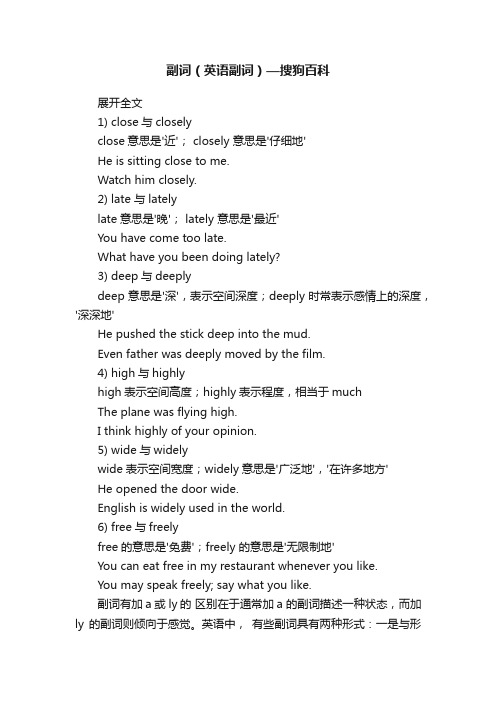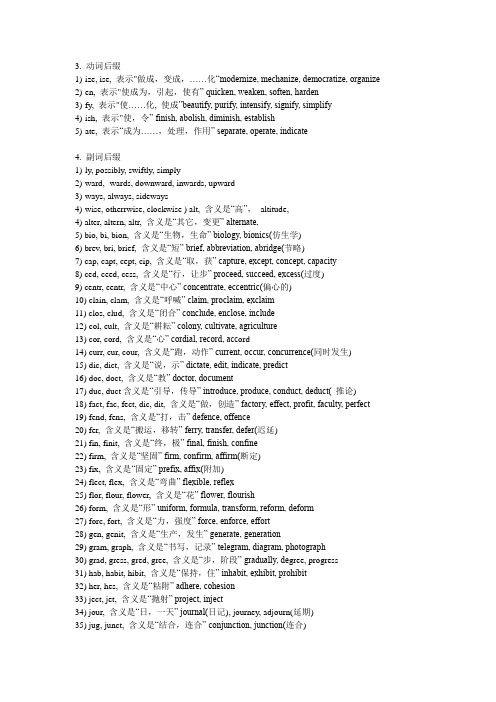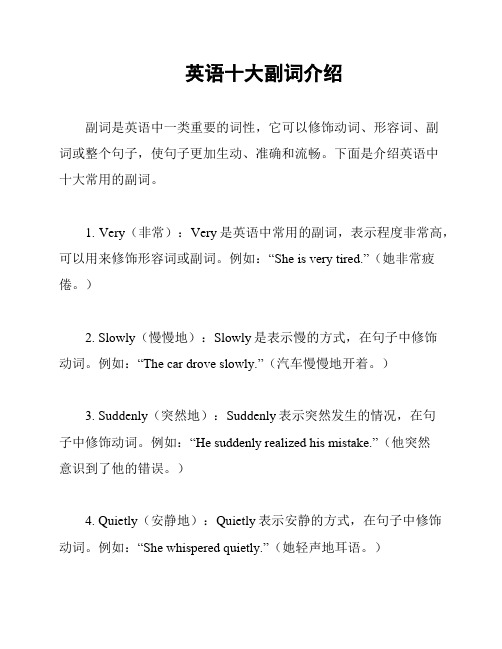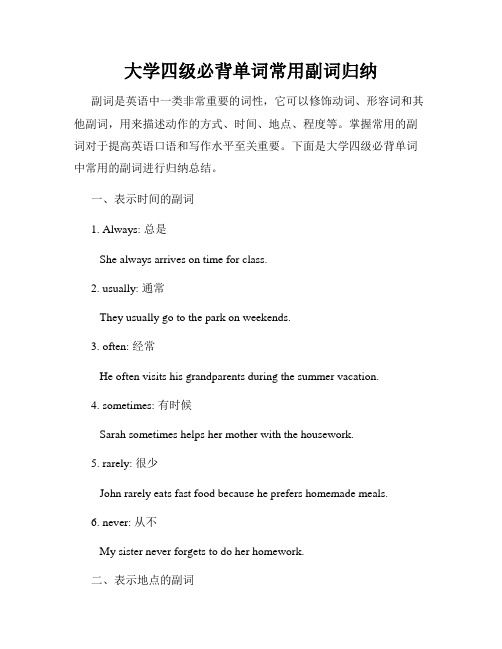大学英语 副词
四、六级英语常用副词

常用的副词actually 实际上;真实地[ Actually, it bores me stiff.totally 完全地[ I totally agree. 我完全同意。
]eventually最后[ so that amazing progress eventually occurs in short periods.] recently 最近[ has recently come into fashion ]absolutely [[美, 俚](用于答话)是, 当然是; 正是如此Do you think so? Absolutely. 你是这样想吗? 当然是。
]largely 很大程度上,大部分[largely depend on.....]basically 基本上currently 现在,当前,普遍地,通常地probably 大概,或许surely 确切地[i'd surely be a hippie child]personally 就自已而言,亲自地seriously adv. 严肃地, 认真地, 严重地表时间:afterwards然后后来, later稍后随后,eventually最后终于,hence 从此今后from this time/from now 从此今后directly直接地立即, quickly很快地,shortly立刻不久,soon 不久马上nowadays现今,presently目前不久,lately近来的,表频率:constantly, continuously不断地经常地repeatedly重复地再三地,frequently经常地,occasionally偶尔地,seldom很少不常,rarely很少地,yearly,monthly,weekly表逻辑:accordingly 相应地In accordance; correspondingly.likewise同样地照样,* The food was excellent, (and) likewise the wine. 菜好极了, 酒也是.* I'm going to bed and you would be well advised to do likewise. 我要睡觉了,你最好也睡吧.accordingly 因此,consequently因此,hence因此, thereby因此由此merely只不过仅仅merely a flesh wound.仅仅是皮肉伤furthermore, moreover, besidesnevertheless, nonetheless; however仍然* He is often rude to me, but I like him nevertheless.他时常对我粗鲁无礼, 但我还很喜欢他.In spite of sth;尽管,regardless 无论如何continues to work regardless.不顾后果地继续工作表语气:actually, definitely, undoubtedly,absolutelynormally, generally,wholly完全地彻底地likely或许很可能,virtually事实上实质上,naturally,necessarily必要地,similarly类似地同样地simply简单地conversely 相反地颠倒地respectively 逐个地分别的,individually个别地* speak to each member of a group individually 对组里每个人逐个地说.separately个别地单独地roughly概略地大致地,somewhat稍微有点表程度:approximately, nearly,largely, mainly, mostly, primarily,increasingly, , partly,scarcely, considerably, extremely, enormously, greatly,3、常见形容词absent from 不在,缺席abundant in 富于alien to 与...相反angry with sb at/about sth 生气,愤怒anxious about/for 忧虑,担心appropriate for/to 适当,合适applicable to 适用于apt at 聪明,善于apt to 易于ashamed of 羞愧,害臊approximate to 近拟,接近aware of 意识到abailable to sb for sth 可用,可供bare of 几乎没有,缺乏bound for 开往...capable of 能够careful of/about/with; 小心,注意certain of /about 确信,肯定about/in doing characteristic of 特有,独特clear of 没有,不接触clever at 善于close to 接近,亲近comparable to/with 可比较conscious of 察觉到,意识到consequent on 随之而来considerate towards 体谅,体贴contemporary with 与...同时代content with 满足于contrary to 违反counter to 与...相反crazy about 热衷,着迷critical of 挑剔,批评curious about 好奇,想知道distinct from 种类(风格)不同doubtful of /about 怀疑east of 在...东面equal to 相等,胜任equivalent to 等于,相当于essential to/for 必不可少expert at/in/on 善于faithful to 忠实于familiar to sb 为...所熟悉familiar with sth 熟悉,通晓fatal to 致命的favourable to 支持,赞成favourable for 有帮助的fearful of 惧怕fit for 适于foreign to 非...所原有fond of 喜欢free of /from 未受...;免费free with 康慨,大方guilty of 有...罪的hungry for 渴望ignorant of 不知道impatient at sth. 不耐烦impatient of 无法容忍with sb independent of 不受...支配impatient for 急切,渴望indifferent to 无兴趣,不关心indignant with sb. 愤慨inferior to 级别低于,不如ab/about sth innocent of 无...罪,无辜intent on 专心于invisible to 不可见的jealous of 嫉妒keep on 爱好,很喜欢liable for 对...有责任liable to 易于loyal to 忠于mad at/with sb. 生气,愤怒mad with 因...发狂next to 下一个,其次necessary to /for 必要的opposite to 在对面open to 不限制,开放的particular about 挑剔,讲究parallel to 与...平等,类似peculiar to 独特的,独有的patient with 有耐心prior to 在...之前popular with 受...喜爱,爱戴representative of 代表...的relative to 与...有关rich in 富于responsible for 负责,是...原因sensitive to 对...敏感sensible of 觉查到sick of 厌恶,厌倦short of 缺少skilled at /in 善于similar to 相似sufficient for 足够的subject to 受制于,易于superior to 优于,级别高于suitable for/to 适合于suspicious of 怀疑sure of /about 对...有信心,确信typical of 是典型的,特有的tired of 对...不在感兴趣votal to 对...关系重大uncertain of /about 不确知mad about/on 狂热迷恋void of 没有,缺乏。
副词(英语副词)—搜狗百科

副词(英语副词)—搜狗百科展开全文1) close与closelyclose意思是'近'; closely 意思是'仔细地'He is sitting close to me.Watch him closely.2) late 与latelylate意思是'晚'; lately 意思是'最近'You have come too late.What have you been doing lately?3) deep与deeplydeep意思是'深',表示空间深度;deeply时常表示感情上的深度,'深深地'He pushed the stick deep into the mud.Even father was deeply moved by the film.4) high与highlyhigh表示空间高度;highly表示程度,相当于muchThe plane was flying high.I think highly of your opinion.5) wide与widelywide表示空间宽度;widely意思是'广泛地','在许多地方'He opened the door wide.English is widely used in the world.6) free与freelyfree的意思是'免费';freely 的意思是'无限制地'You can eat free in my restaurant whenever you like.You may speak freely; say what you like.副词有加a或ly的区别在于通常加a 的副词描述一种状态,而加ly 的副词则倾向于感觉。
英语中,有些副词具有两种形式:一是与形容词同形;二是由该形容词后加-ly构成(以下称形容词形副词和-ly形副词)。
副词-专升本英语语法详细讲解课件

Have you been there already?
③做“还”讲时, yet用于否定句, still用于肯定 句、疑问句, 表示“依然、继续”, 有时也用于 否定句。
The rain hasn’t stopped yet.
It’s still raining now.
四.同源副词
A)
5.I used to smoke _______ but I gave it up three years ago.
A) seriously B) heavily C) badly D) severely
B)
6.The organization had broken no rules, but _____ had it acted responsibly. A) neither B) so
A) essentially B) completely C) necessarily D) remarkably
A)
3.Our journey was slow because the train stopped ________ at different villages.
A) unceasingly B) gradually C) continuously D) continually
4.so, neither与nor
三个词都能表示后者和前者情况相似。 so用于肯定句, neither和nor用于否定 句。
①He likes skating. So do I. ②The first one wasn't good, and
neither/nor was the second.
2. late, lately late意思是“晚”, lately意思为“近来” You have come too late. Have you see him lately?
大学英语四六级实用总结之动词副词后缀

3. 动词后缀1)-ize, ise, 表示"做成,变成,……化“modernize, mechanize, democratize, organize2)-en, 表示"使成为,引起,使有” quicken, weaken, soften, harden3)-fy, 表示"使……化, 使成”beautify, purify, intensify, signify, simplify4)-ish, 表示"使,令” finish, abolish, diminish, establish5)-ate, 表示“成为……,处理,作用” separate, operate, indicate4. 副词后缀1)-ly, possibly, swiftly, simply2)-ward, -wards, downward, inwards, upward3)-ways, always, sideways4)-wise, otherrwise, clockwise ) alt, 含义是“高”,altitude,4) alter, altern, altr, 含义是“其它,变更” alternate,5) bio, bi, bion, 含义是“生物,生命” biology, bionics(仿生学)6) brev, bri, brief, 含义是“短” brief, abbreviation, abridge(节略)7) cap, capt, cept, cip, 含义是“取,获” capture, except, concept, capacity8) ced, ceed, cess, 含义是“行,让步” proceed, succeed, excess(过度)9) centr, centr, 含义是“中心” concentrate, eccentric(偏心的)10) clain, clam, 含义是“呼喊” claim, proclaim, exclaim11) clos, clud, 含义是“闭合” conclude, enclose, include12) col, cult, 含义是“耕耘” colony, cultivate, agriculture13) cor, cord, 含义是“心” cordial, record, acc ord14) curr, cur, cour, 含义是“跑,动作” current, occur, concurrence(同时发生)15) dic, dict, 含义是“说,示” dictate, edit, indicate, predict16) doc, doct, 含义是“教” doctor, document17) duc, duct含义是“引导,传导” introduce, produce, conduct, deduct( 推论)18) fact, fac, fect, dic, dit, 含义是“做,创造” factory, effect, profit, faculty, perfect19) fend, fens, 含义是“打,击” defence, offence20) fer, 含义是“搬运,移转” ferry, transfer, defer(迟延)21) fin, finit, 含义是“终,极” final, finish, confine22) firm, 含义是“坚固” firm, confirm, affirm(断定)23) fix, 含义是“固定” prefix, affix(附加)24) flect, flex, 含义是“弯曲” flexible, reflex25) flor, flour, flower, 含义是“花” flower, flourish26) form, 含义是“形” uniform, formula, transform, reform, deform27) forc, fort, 含义是“力,强度” force, enforce, effort28) gen, genit, 含义是“生产,发生” generate, generation29) gram, graph, 含义是“书写,记录” telegram, diagram, photograph30) grad, gress, gred, gree, 含义是“步,阶段” gradually, de gree, progress31) hab, habit, hibit, 含义是“保持,住” inhabit, exhibit, prohibit32) her, hes, 含义是“粘附” adhere, cohesion33) ject, jet, 含义是“抛射” project, inject34) jour, 含义是“日,一天” journal(日记), journey, adjourn(延期)35) jug, junct, 含义是“结合,连合” conjunction, junction(连合)36) labour, labor, 含义是“劳动,工作” labourer, elaborate, collaborate37) lect, leg, lig, 含义是“挑选,采集” collect, selec t, lecture38) lif, liv, 含义是“生活,生存” life, alive, live39) loc, 含义是“场所,位置” location, dislocate(脱位)40) long, leng, ling, 含义是“长的” length, prolong, linger41) loqu, locut, 含义是“说话” colloquial, eloquent,42) mand, mend, 含义是“命令” command, demand, recommend43) man, manu, 含义是“手,手法” manage, manual44) memor, menber, 含义是“记忆” memory, remember, memorial45) mind, ment, 含义是“心” mind, remind, mental46) merc, merch, 含义是“贸易” commerce, merchant47) meas, mens, meter, metr, 含义是“测量,度量” measure, meter, diameter48) min, 含义是“小” diminish, minority49) miss, mit, 含义是“派遣,送” mission, dismiss, transmit, missile50) mob, mot, mov, 含义是“动” movement, motion, mobile, remove51) nect, nex, 含义是“捆扎” connect, disconnect, annex(合并)52) not, 含义是“记号,注意” note, denote, annotation(注释)53) onom, onym, 含义是“名字” synonym, antonym, anonymous54) pair, par, 含义是“a)相同,对等b)准备” compare, prepare55) pel, puls, 含义是“追逐” expel, impel(推进)56) pend, pens, pond, 含义是“悬挂” depend, independent, expense(支付)57) phon, 含义是“声音” symphony, telephone, microp hone58) plac, 含义是“位置,场所” place, replace59) peopl, popul, publ, 含义是“人民,民众” public, republic, popular, people60) port, 含义是“搬运” export, import, deport(输送)61) press, 含义是“压,压制” pressure, express, oppress, impression62) prob, proof, prov, 含义是“实验,验证” pr ove, approve,63) quer, quest, quir, quis, 含义是“寻找,探问” inquiry, question, inquisition(调查,追究)64) rang, rank, 含义是“排列” arrange, rank,65) rect, right, rig, 含义是“正,直” correct, direct, erect66) riv, 含义是“河流,流远”,river, arrive, derive67) rupt, 含义是“破坏,毁坏” eru ption, bankrupt, corruption68) sci, 含义是“认识,知识” science, conscious69) scrib, script, 含义是“书写,记录” describe, script70) sens, sent, 含义是“感觉,情感” sensation, sentiment71) sign, 含义是“标记,符号” signal, signature, design72) sembl, simil, 含义是“相似,类似” similar, rese mble, assimilate(同化)73) soci, 含义是“结合,社交” social, association74) spec, spect, spitc, spis, 含义是“看,视” inspect, spectator, conspicuous, respect75) struct, 含义是“建筑,构造” structure, construct, instruct, destruction76) tect, teg, 含义是“遮蔽,掩盖” detect, protect77) temp, tens, 含义是“时间,时机” tense, contemporary, temporal78) tend, tes, tent, 含义是“倾向, 伸张” tendency, intension, extend, intend79) test, 含义是“证明,证实” testify, protest, contest(争论)80) text, 含义是“编织,构成” textile, texture, context81) tract, trail, 含义是“拖拉,吸引” attract, tractor, abstract, contract(收缩)82) tribut, 含义是“给予” contribution, distribute83) us, ut, 含义是“用,使用” usable, utilize, abuse84) vac, van, 含义是“空,虚” vacancy, vanity, evacuate(清空)85) vad, vas, wad, 含义是“走,去” invade, wade, evade(逃避)86) vers, vert, 含义是“旋转,反转” convert, inversion(倒转),reverse, divert(使转向)87) vid, vis, vey, view, 含义是“观看,看见” television, visible, evident, interview, survey88) viv, vit, 含义是“生,活” vivid, vital, survival,89) war, ward, 含义是“注意,保护” aware, wary(谨慎),ward(守护)90) way, 含义是“路” way, away, subway, always。
英语副词知识点笔记整理

英语副词知识点笔记整理1.副词的定义副词(Adverb)是一种用来修饰动词、形容词、副词或全句的词类。
它可以表示时间、地点、程度、方式等概念,用于更具体地描述动作或状态。
2.副词的分类2.1根据修饰对象分类程度副词:如very(非常)、quite(相当)、extremely(极其),表示事物的程度。
时间副词:如now(现在)、soon(很快)、yesterday(昨天),表示事物的时间。
地点副词:如here(这里)、there(那里)、everywhere(到处),表示事物的地点。
方式副词:如quickly(迅速地)、carefully(小心地)、quietly(安静地),表示事物的方式。
2.2根据形式分类简单副词:由一个单词构成,如fast(快速地)、often(经常)、well(好)。
复合副词:由两个或更多单词组成,如upstairs(楼上)、on purpose(故意地)、in vain(徒劳地)。
3.副词的位置副词通常位于动词之后,形容词之前,例如:She speaks **fluently**.(她讲得流利。
)有些副词可以放在句首或句末,用于强调或表达特定的语气,例如:**Certainly**,I will help you.(当然,我会帮助你。
)4.副词的比较级和最高级大多数副词的比较级和最高级是在其前面加上more和most,例如:carefully(小心地)→more carefully(更小心地)→most carefully(最小心地)。
部分副词的比较级和最高级形式与形容词相同,例如:well(好)→better(更好)→best(最好)。
5.副词的用法注意事项注意区分副词和形容词的用法,形容词修饰名词,副词修饰动词、形容词或其他副词。
一些常见的副词形式不规则,例如:good(好)→well(好地)、bad(坏)→badly(坏地)。
在表示频率的副词中,通常将副词放在动词之前,例如:I often go to the park.(我经常去公园。
英语十大副词介绍

英语十大副词介绍副词是英语中一类重要的词性,它可以修饰动词、形容词、副词或整个句子,使句子更加生动、准确和流畅。
下面是介绍英语中十大常用的副词。
1. Very(非常):Very是英语中常用的副词,表示程度非常高,可以用来修饰形容词或副词。
例如:“She is very tired.”(她非常疲倦。
)2. Slowly(慢慢地):Slowly是表示慢的方式,在句子中修饰动词。
例如:“The car drove slowly.”(汽车慢慢地开着。
)3. Suddenly(突然地):Suddenly表示突然发生的情况,在句子中修饰动词。
例如:“He suddenly realized his mistake.”(他突然意识到了他的错误。
)4. Quietly(安静地):Quietly表示安静的方式,在句子中修饰动词。
例如:“She whispered quietly.”(她轻声地耳语。
)5. Clearly(清晰地):Clearly表示明确的方式,在句子中修饰动词或形容词。
例如:“He spoke clearly.”(他说话清晰明了。
)6. Really(真正地):Really表示真正的方式或程度,在句子中修饰形容词或副词。
例如:“I'm really tired.”(我真的很累。
)8. Carefully(小心地):Carefully表示小心的方式,在句子中修饰动词。
例如:“She handled the fragile vase carefully.”(她小心地处理着易碎的花瓶。
)9. Happily(快乐地):Happily表示快乐的方式,在句子中修饰动词。
例如:“They danced happily all night.”(他们快乐地跳了一整晚。
)10. Hardly(几乎不):Hardly表示几乎不的程度,在句子中修饰动词。
例如:“He hardly ever goes out.”(他几乎从不出门。
大学英语语法 第六讲 副 词

第六讲副词一、分类在意义上, 副词可以分为时间副词( now, late ) , 地点副词( here, up) , 程度副词( very,so) , 频率副词(often , rarely) , 方式副词( fast , easily) , 态度副词(maybe, honestly)和逻辑连接副词(hence, however)等。
在功能上, 副词可以分为一般副词( there) , 疑问副词(when) , 连接副词( how, where) ,关系副词( as , why)和解释性副词( namely, for example, i . e . 那就是, e . g . 例如, viz 即)等。
关系副词引导定语从句, 连接副词引导主语从句、表语从句、宾语从句或不定式等。
二、构成1 . 大部分副词由相应的形容词加上后缀-ly 构成, 但注意有变化1)一般情况slow →slowly dear →dearly cool→coolly bad→badly2) -y 结尾的词happy→happily angry→angrily但shy→shyly(或shily) , gay→gayly(或gaily) , dry→dryly(或drily)3) -le 结尾的词, 省去-e 再加-ysubtle→subtly noble→nobly4) -ue 结尾的词, 去掉-e, 再加-lyt rue→truly due→duly5) -e 结尾的词, 直接加-lycomplete→completely wise→wisely wide→widely lone→lonely6) -ic 结尾的词, 加-allyeconomic→economically historic→historically t ragic→t ragically7) -ly 结尾的词, 去掉-y, 加-ilymelancholy→melancholily manly→manlily chilly→chillily8) -ll 结尾的词, 只加-yfull→fully dull→dully9)其他词类+ -ly 构成的副词first (序数词)→firstly over(介词)→overly most (不定代词)→mostlyaccording(现在分词)→accordingly determined(过去分词)→determinedlymatter-of-fact(短语)→matter-of-factly kind-hearted(形容词)→kind-heartedly2 . 有些副词是由介词或地点名词加后缀-ward(s)构成的, 意为“向⋯⋯”forward( s) , backward( s) , downward ( s ) , northward ( s) , upward( s ) , homeward( s) , onward( s) , inward( s)3 . 有些副词是由名词加后缀-wise 构成的, 表示位置、方向、状态、有关等意义sidewise, clockwise, money-wise, saleswise, lengthwise, educationwise,weatherwise①有少数副词加后缀-ways , -long, -ling( s)构成。
大学四级必背单词常用副词归纳

大学四级必背单词常用副词归纳副词是英语中一类非常重要的词性,它可以修饰动词、形容词和其他副词,用来描述动作的方式、时间、地点、程度等。
掌握常用的副词对于提高英语口语和写作水平至关重要。
下面是大学四级必背单词中常用的副词进行归纳总结。
一、表示时间的副词1. Always: 总是She always arrives on time for class.2. usually: 通常They usually go to the park on weekends.3. often: 经常He often visits his grandparents during the summer vacation.4. sometimes: 有时候Sarah sometimes helps her mother with the housework.5. rarely: 很少John rarely eats fast food because he prefers homemade meals.6. never: 从不My sister never forgets to do her homework.二、表示地点的副词1. here: 这里Come here and have a seat.2. there: 那里The museum is over there.3. everywhere: 到处The children left their toys everywhere in the room.4. nowhere: 无处I searched for my keys everywhere, but they were nowhere to be found.5. upstairs: 楼上Please go upstairs and get the book.6. downstairs: 楼下The kitchen is downstairs.三、表示程度的副词1. very: 非常The movie was very interesting.2. extremely: 非常The weather is extremely hot today.3. quite: 相当The cake you made is quite delicious.4. fairly: 相当He is fairly tall for his age.5. really: 真正地She was really happy to see her friends.6. pretty: 相当It was a pretty good performance.四、表示方式的副词1. slowly: 缓慢地The turtle moves slowly.2. quickly: 快速地She finished her homework quickly.3. quietly: 安静地The baby is sleeping quietly.4. loudly: 大声地The music is played loudly in the concert. 5. happily: 快乐地The children were playing happily in the park.6. carefully: 仔细地Please read the instructions carefully before starting.五、其他常用副词1. also: 也He is good at playing the guitar. He also plays the piano.2. even: 甚至She is so tired that she cannot even walk.3. just: 只是I just want to ask a question.4. already: 已经They have already left for the airport.5. still: 仍然The baby is sleeping. He is still asleep.6. yet: 还,尚I haven't finished my homework yet.7. maybe: 也许Maybe we can go to the park tomorrow if it doesn't rain.以上是大学四级必背单词中常见的副词归纳,掌握这些副词的用法和意义,将会对提高英语能力有很大的帮助。
- 1、下载文档前请自行甄别文档内容的完整性,平台不提供额外的编辑、内容补充、找答案等附加服务。
- 2、"仅部分预览"的文档,不可在线预览部分如存在完整性等问题,可反馈申请退款(可完整预览的文档不适用该条件!)。
- 3、如文档侵犯您的权益,请联系客服反馈,我们会尽快为您处理(人工客服工作时间:9:00-18:30)。
I hope you’ll enjoy your stay here. 希望你在这里过得愉快
修饰动词, 形容词,副词和句子
1. She is shaking her body crazily.
They moved downtown. here这里,there那里,upstairs楼上,downstairs 楼下,anywhere任何地方,above在上方,up上面, down下面,east向东,west向西
方式副词:
She don’t want to accept the man’s present, but she don’t want to hurt his feeling. She refused it g_e_n__tl.y
你可以畅所欲言,想说什么就说什么。
副词的比较级和最高级
1.我越来越讨厌他。 2.她越想越气。 3.你最好别烦她。 4.你应当懂得不要把所有钱都花在买衣服上。 5.他本想和我顶嘴的,但没有这样做。 6.他以前是个花花公子,后来改变了。
副词比较级和最高级的一些特殊用法
1)more and more 越来越…
英语在世界范围内广泛使用。
6) free与freely
free的意思是“免费”;freely 的意思是“无限制地
You can eat free in my restaurant whenever you like.
无论什么时候,我这饭店免费对你开放。
You may speak freely; say what you like.
程度/强调副词:
perfectly clear awfully sorry utterly unreasonable partly right
十分清楚 非常抱歉
极不合理
对了一点
疑问副词,如: how, when, where. why 放在特殊疑问句句首。
关系副词,如:
when, where, why, whether, 引导定语从句。 连接副词,如:
1. Wife talking to her husband (who reads newspaper all day): I wish I were a newspaper so I'll be in your hands all day. Husband: I wish that too, so I could change you daily. 时间副词
3) had better/had best 最好 You had better leave her alone. 翻译:你最好别等他们了。 You had better not wait for them.
4) know better than (to) do something 懂得不 宜做某事
2. 形容词+ly构成副词 luckily, sadly, happily, naturally…
注意: 名词+ly构成形容词 name some of them
friendly, lovely, lonely, homely, manly, motherly, deadly, ugly, silly, likely, brotherly, timely…
2. The worst way to miss someone is to be sitting right beside them knowing you can’t have them. 强调副词
3. Don’t try so hard, the best things come when you least expect them to. 程度副词
1.作状语
2)修饰形容词 3)修饰副词
4)修饰句子
1.They listened to the teacher attentively and took notes every now and then.
2. The ticket is terribly expensive.
3.I like English very much.
4.Obviously,he is telling a lie.
Actually/luckily/generally/unfortunately etc常 用来修饰句子.
1) 表语
其他用法: 2)宾语补足语
3)定语
The fire has been out for half an hour. 火已熄灭半小时了
4. Love is like a butterfly. It goes where it pleases and it pleases where it goes.
5. If winter comes, can spring be far behind?
副词
副词的类型 副词的作用 副词的构成 副词的比较级和最高级
2. Fill in the blank
1. My purse was stolen on the bus yesterday. __________ (Fortunate), there was no money in it.
2. The worst way to miss someone is to be sitting right beside them knowing you can’t have them.
3. Don’t try so hard, the best things come when you least expect them to.
副词的类型
时间
地点
句子
方式
language
疑问/连接/关系
component
程度/强调
时间副词:发生的时间和频率 你今晚有空吗? Will you be free tonight.
她老是改变主意。 She is constantly changing her mind.
地点副词:
她在国外留学。 She is studying abroad. 他们搬到城里去了。
2) late 与lately late意思是"晚";lately 意思是"最近"
You have come too late. What have you been doing lately?
3) deep与deeply
deep意思是"深",表示空间深度;deeply时常表示感情 上的深度,"深深地"。
2. I am slightly faint when I stare at the picture. 3. She is moving too fast.
4. Honestly, I don’t take it as dancing.
副词的构成 1.与形容词同形的副词有:deep ,high, hard, daily, early, fast, near, low , far, little, straight, pretty, enough, only, direct ect. Memorize it
They don’t want to solve the problem with violence. They hoped to see it settled _p_e_a_c.efully
calmly冷静地,carefully仔细地,小心地, carelessly粗心地,patiently耐心地,politely礼貌地, proudly自豪地,properly适当地,quickly快速地, rapidly迅速地,suddenly突然,successfully成功地, willingly情愿地,warmly热情地 make sentences
She sang lovely. Her singing was lovely.
He spoke to me very friendly.
He spoke to me in a very friendly way.
3. 兼有两种形式的副词 1) close与closely
close意思是"近";closely 意思是"仔细地" He is sitting close to me. Watch him closely.
I think highly of your opinion. 你的看法很有道理。
5) wide与widely
wide表示空间宽度;widely意思是“广泛地”, He opened the door wide.
他把门开得大大的。 English is widely used in the world.
1. Wife talking to her husband (who reads newspaper all day): I wish I were a newspaper so I'll be in your hands all day. Husband: I wish that too, so I could change you daily.
I hate him more and more. 翻译:劳动节越来越近了。 The May day is drawing nearer and nearer.
2) the more…the more 越…, 越… The more she thought, the more angry she got. 翻译:我对他了解越深就越喜欢他。 The better I knew him, the more I liked him.
4. Love is like a butterfly. It goes where it pleases and it pleases where it goes. 连接副词
